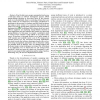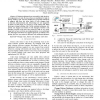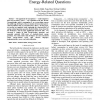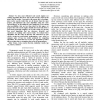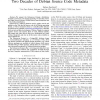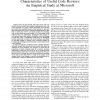MSR
2015
ACM
9 years 10 months ago
2015
ACM
—Over the last years, energy consumption has become a first-class citizen in software development practice. While energy-efficient solutions on lower-level layers of the softwa...
MSR
2015
ACM
9 years 10 months ago
2015
ACM
—Infrastructure-as-code automates the process of configuring and setting up the environment (e.g., servers, VMs and databases) in which a software system will be tested and/or d...
MSR
2015
ACM
9 years 10 months ago
2015
ACM
Abstract—Existing techniques have succeeded to help developers implement new code. However, they are insufficient to help to change existing code. Previous studies have proposed...
MSR
2015
ACM
9 years 10 months ago
2015
ACM
—Software code review is a well-established software quality practice. Recently, Modern Code Review (MCR) has been widely adopted in both open source and proprietary projects. To...
MSR
2015
ACM
9 years 10 months ago
2015
ACM
— The popularity of smartphones — small computers that run on battery power — has exploded in the last decade. Unsurprisingly, power consumption is an overarching concern for...
MSR
2015
ACM
9 years 10 months ago
2015
ACM
Abstract—As developers face ever-increasing pressure to engineer secure software, researchers are building an understanding of security-sensitive bugs (i.e. vulnerabilities). Res...
MSR
2015
ACM
9 years 10 months ago
2015
ACM
—To date, most dedicated code search engines use ranking algorithms that focus only on the relevancy between the query and the results. In practice, this means that a developer m...
MSR
2015
ACM
9 years 10 months ago
2015
ACM
—We present the Debsources Dataset: distribution metadata and source code metrics spanning two decades of Free and Open Source Software (FOSS) history, seen through the lens of t...
MSR
2015
ACM
9 years 10 months ago
2015
ACM
Abstract—Deep learning subsumes algorithms that automatically learn compositional representations. The ability of these models to generalize well has ushered in tremendous advanc...
MSR
2015
ACM
9 years 10 months ago
2015
ACM
Abstract—Over the past decade, both open source and commercial software projects have adopted contemporary peer code review practices as a quality control mechanism. Prior resear...
